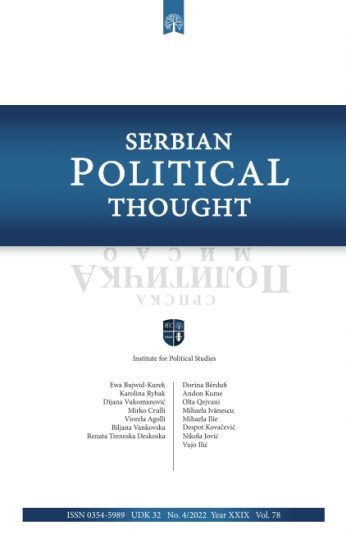Main topic
Serbian Political Thought
Perception of Discrimination in Serbia: Normative Framework and Practice
Abstract
The paper, firstly, points to the existing normative anti-discrimination framework of the Republic of Serbia, or whether and to what extent the existing Serbian legal solutions comply with international standards. The authors then present a comparative analysis of the results of their research into the attitudes of Serbian police to discrimination with those of similar research conducted among citizens and other public administration representatives in Serbia up to this point. Thus, the authors offer a complete picture of how Serbian citizens and public administration representatives, including the police, perceive discrimination in Serbia. In the third part of the paper, the authors attempt to point to the most important indicators and results of institutional response to the forms of discrimination manifested in the Serbian society, particularly through the activity of the Commissioner for the Protection of Equality, and through the analysis of case law and jurisprudence of the Constitutional Court of Serbia.
References
- Act on Means of Determining the Maximum Number of Public Sector Employees. (2015) Official Gazette of RS, No. 85/2015 (online) Avaliable at: http://nezavisnost.org/wp-content/uploads/2017/01/Zakon-o-nacinu-odredivanja-maksimalnog-broja-zaposlenih-u-javnom-sektoru.pdf (Accessed 19, mart 2017)
- Bantekas, I., and Oette, L. (2013) “International Human Rights Law and Practice”. Cambridge: Cambridge University Press.
- CeSid, (2013) “Izveštaj o istraživanju javnog mnjenja – Odnos prema diskriminaciji u Srbiji“. Beograd: Kancelaraija Poverenika za zaštitu ravnopravnosti.
- Commissioner’s Report, (2017) “Regular Annual Report of the Commissioner for the Protection of Equality for 2017”. Belgrade: Government of the Republic of Serbia.
- Constitution of Serbia. (2006) Official Gazette of the Republic of Serbia, no. 98/2006, (online) Avaliable at: https://www.paragraf.rs/propisi/ustav_republike_srbije.html (Accessed 10 februar 2017).
- Constitutional Court Decision (2008), Decision No. VIIU 171/2008, (online) Avaliable at: http://www.ustavni.sud.rs/page/jurisprudence/35/ (Accessed 20 may 2017)
- Constitutional Court Decision (2009), Decision No. VII U 249/2009. (online) Avaliable at: http://www.ustavni.sud.rs/page/jurisprudence/35/ (Accessed 21 may 2017)
- Constitutional Court Decision (2014), Decision No. Uz – 8760/2014 (online) Avaliable at: http://www.ustavni.sud.rs/page/jurisprudence/35/ (Accessed 24 may 2017)
- Constitutional Court Decision (2015), Decision No. IUz-244/2015. (online) Avaliable at: http://www.ustavni.sud.rs/page/jurisprudence/35/ (Accessed 28 may 2017)
- Council of Europe, (2010) High Level Meeting on Roma Strasbourg, CM(2010)133 final, (online) Avaliable at: https://www.minori.it/sites/default/files/The_Strasbourg_Declaration_on_Roma.pdf (Accessed 15 mart 2017).
- Doebler, CFJ. (2007) “Principle of Non-Discrimination in International Law”. New York: CD Publishing.
- Euractiv, (2013) “Mali broj sudskih postupaka za zastitu od diskriminacije”, (online) Avaliable at: http://www.euractiv.rs/ljudska-prava/5562-mali-broj-sudskih-postupaka-za-zatitu-od-diskriminacije-.html (Accessed 12 april 2017)
- Ipsos Strategic Marketing, (2013) “Odnos predstavnika organa javne vlasti prema diskriminaciji u Srbiji”. Beograd: Kancelarija Poverenika za zaštitu ravnopravnosti.
- Jones, M. (2015) “Who Forgot Lesbian, Gay and Bisexual Police Officers? Findings from a National Survey”, in: Policing: An International Journal of Police Strategies and Management, 9(1): pp. 65-76.
- Kääriäinen, J., Sirén, R. (2012) “Do the police trust in citizens? European comparisons”, in: European Journal of Criminology, 9(3): pp.276–289
- Kesić, Z. (2016) „Društvena stigmatizacija kao generator diskriminativnog postupanja policije – teorijske osnove“, u: Anali Pravnog fakulteta u Beogradu, LXIV (1): str. 214-237.
- Loftus, B. (2009) “Police Culture in a changing World”. New York: Oxford University Press.
- Mršević, Z. (2014) „On the Strategy of Prevention and Protection against Discrimination as the Basic Document of the State’s Anti-Discrimination Policy“, in: Temida, No.2: 45-64
- Simović, D., Zekavica, R. (2012) “Policija i ljudska prava”, Beograd: Kriminalističko-policijska akademija.
- Simović, D. (2015) “Rodna ravnopravnost u svetlosti ostvarivanja slobode veroispovesti”, u: Zbornik radova Pravnog fakulteta u Nišu, LIV (70): str. 101-118.
- Simović, D. (2013) “Problem politizacije i sastav ustavnog suda”, Nenadić B (pr.) Okrugli sto – Uloga i značaj ustavnog suda u očuvanju vladavine prava, Beograd. str. 242-258.
- Todorović, K., Stjelja, I., Grujić, N. (2013) “Antidiskriminacioni mehanizmi u praksi”. Beograd: YUCOM Komitet pravnika za ljudska prava,.
- Uildriks, N. (2005) “Police Reform and Human Rights in Post-Communist Societies”, Uildriks N (ed.) Police Reform and Human Rights: Opportunities and Impediments in Post-Communist Societies, Intersentia, Antwerpen:Oxford University Press: pp. 7-13.
- Zekavica, R. (2014) “Suzbijanje diskriminacije u Republici Srbiji, s posebnim osvrtom na ulogu Ministarstva unutrašnjih poslova- komprativna analiza”. Beograd: Kancelarija za ljudska i manjinska prava Vlade RS.
- Zekavica, R., Kešetović, Ž. (2015) “The Legitimacy of the Police in Serbia”, in: NBP – Journal of Criminalistics and Law, XX(3): pp. 19-44.
- Zekavica, R., Kesić, Z. (2016) “Diskriminacija u radu policije – fenomenološka dimenzija”, u: Teme, XL(1): str. 53-68.
- Šurlan, T. (2014) “Rad Komiteta za eliminaciju svih oblika diskriminacije žena – nadzorna ili kvazisudska funkcija”, u: NBP – Žurnal za kriminalistiku I pravo, XIX (2): str. 57-74.
- Šurlan, T. (2015) “The Role of the Committee on the Promotion of Rights of People with Disabilities”, u: “Archibald Reiss Days” – Thematic Conference Proceedings of International Significance, book I. Belgrade: Academy of Criminalistic and Police Studies: pp. 81-93.o

